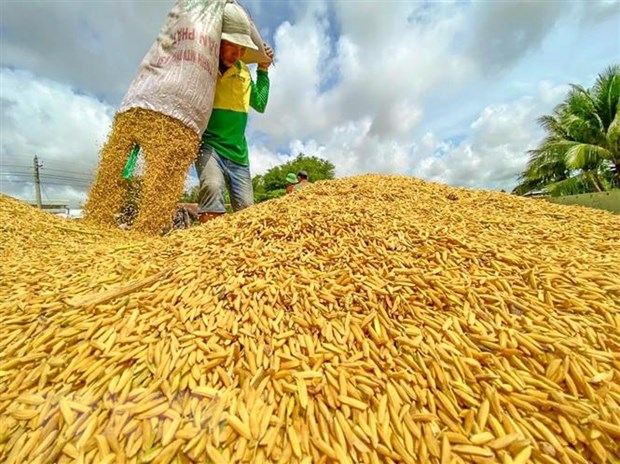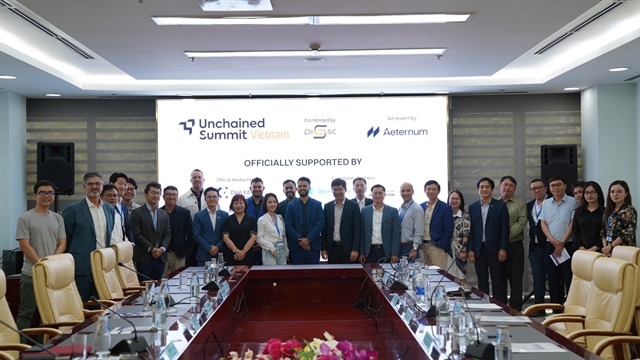 Society
Society


|
| Rice harvesting in the southern city of Cần Thơ. VNA/VNS Photo Thanh Liêm |
HÀ NỘI — Việt Nam must play its part in developing more “transparent, responsible, and sustainable” agri-food systems in response to the COVID-19 pandemic, said Deputy Minister of Agriculture and Rural Development Lê Quốc Doanh.
Speaking at an event marking the 41st World Food Day, and the 76th anniversary of Food and Agriculture Organisation (FAO), Doanh said that Việt Nam recognised the important role of digital technology in increasing the efficiency, productivity and quality of agricultural production.
The country is also paying more attention to the connection between producers and consumers, reducing agricultural waste and increasing the resilience of food supplies during the pandemic.
Doanh said that Việt Nam had been making efforts to promote green sustainable consumption to protect both the environment and public health.
Despite the negative impacts of the COVID-19 pandemic, climate change and natural disasters, Việt Nam has ensured food security for its population of nearly 100 million people. Surplus stock is available for export.
Việt Nam’s agriculture sector provides livelihoods for more than 60 per cent of people living in rural areas and contributes 14.85 per cent to the country’s gross domestic products (GDP).
In the first nine months of this year, Việt Nam gained US$35.5 billion from the export of agricultural products, an increase of 18 per cent compared to the same period the year before.
To mark World Food Day 2021, FAO Director-General QU Dongyu said that “as producers, distributors or consumers, we each have the power to make a positive impact on the transformation”.
“The future of food is in our hands and together we can rewrite the story, starting from today,” he said.
World Food Day 2021 falls on October 16. This year's theme is “Our actions are our future – Better production, better nutrition, a better environment and a better life, leaving no one behind”. To aim is to raise awareness on more efficient, inclusive, resilient and sustainable agri-food systems.
Action is required across all sectors of the industry to ensure that agri-food systems can deliver enough affordable, safe and nutritious food to provide for all.
This is the second World Food Day celebrated during the COVID-19 pandemic, the repercussions of which have disrupted agri-food systems around the world. It has triggered an unprecedented global economic recession resulting in the loss of livelihoods, incomes and increased food insecurity and inequality.
The COVID-19 pandemic has underlined that an urgent change is needed. It has made it even harder for farmers, already grappling with the consequences of climate change, to sell their harvests, while rising poverty is pushing an increased number of city residents to use food banks and emergency food aid.
We will need sustainable agri-food systems capable of sustaining nearly 10 billion people by 2050.
Although people are conscious that our health and well-being depend on the availability of and access to nutritious foods, many are unfamiliar with the concept ‘agri-food systems’ – how we participate in these systems on a daily basis and how our choices and actions impact them.
A sustainable agri-food system is one in which a variety of sufficient, nutritious and safe foods is available at an affordable price to everyone, and nobody is hungry or suffers from malnutrition.
It requires less food being wasted and a food supply chain more resilient to shocks such as extreme weather, price spikes or pandemics while limiting environmental degradation.
A sustainable agri-food system would deliver food security and nutrition for all, without compromising on economic, social and environmental bases, for generations to come.
In September, the United Nations Secretary-General convened the first-ever UN Food Systems Summit to forge a consensus on bold new actions to transform the way the world produces and consumes food, as a means of achieving its Sustainable Development Goals.
The Summit adopted a comprehensive approach to fight poverty and hunger, reduce inequalities and conserve the environment.
In his remarks, FAO Director-General QU Dongyu pledged that the FAO would take a leadership role in implementing the outcomes, working with all to transform agri-food systems.
Also at the summit, President Nguyễn Xuân Phúc affirmed Việt Nam’s commitment to transforming food systems in a “transparent, responsible, and sustainable” manner. VNS




